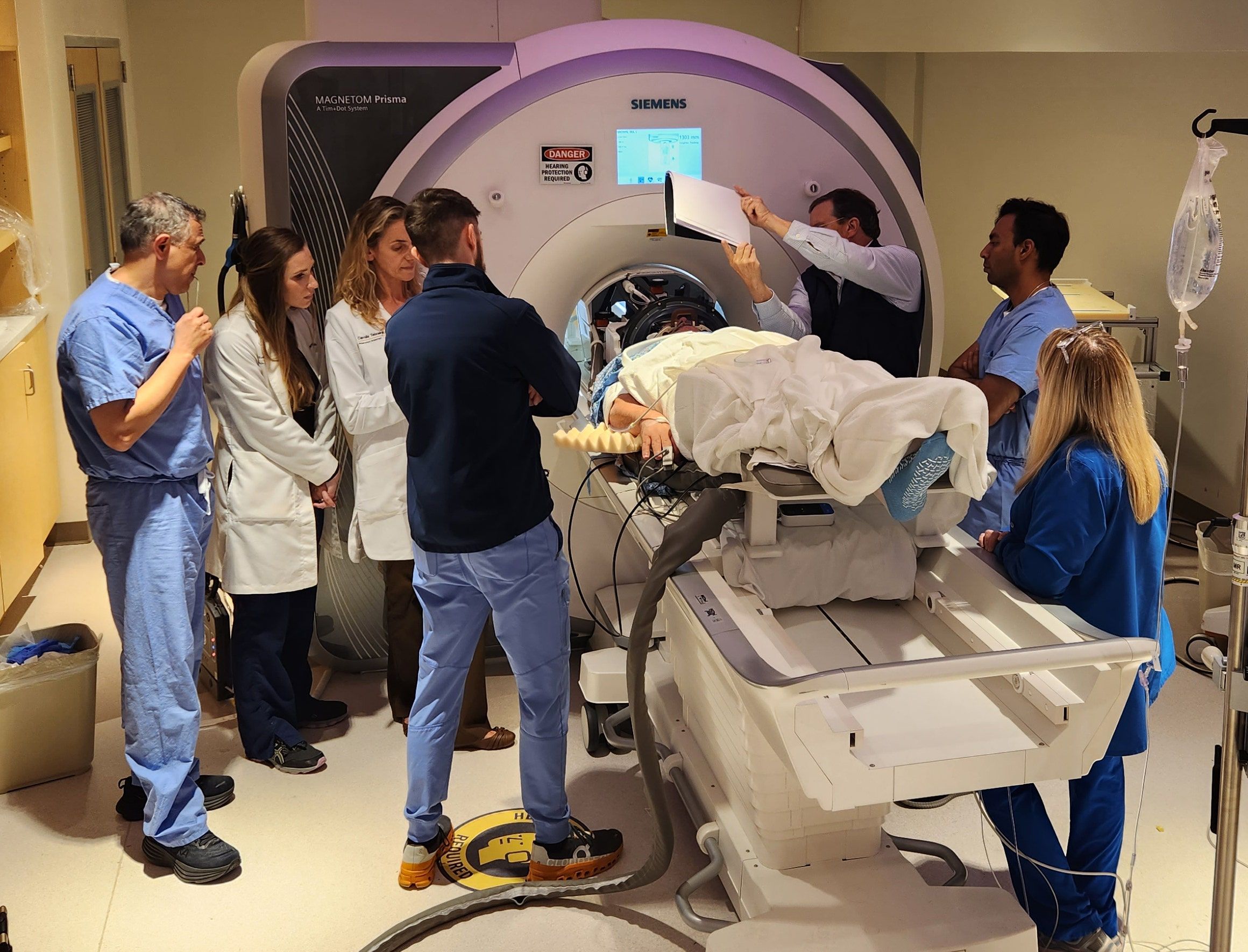a new Alzheimer's therapy has shown potential in early human trials.
Researchers of the West Virginia University The Rockefeller Neuroscience Institute (RNI) found that by combining focused ultrasound with antibody therapies, they were able to accelerate the removal of amyloid beta plaques from the brains of patients with Alzheimer's disease.
The study findings were published in The New England Journal of Medicine on January 11.
FASTING COULD REDUCE SIGNS OF ALZHEIMER'S DISEASE, STUDIES SUGGEST: 'PROFOUND EFFECTS'
An abnormal accumulation of amyloid beta proteins is one of the hallmarks of Alzheimer's, as these proteins clump together to form plaques that interfere with neurons in the brain.
Anti-beta-amyloid monoclonal antibody treatmentssuch as aducanumab and lecanemab, have been shown to be effective in eliminating these plaques and slowing the progression of the disease.
An Alzheimer's patient undergoes focused ultrasound treatment with WVU RNI equipment. (Rockefeller Neuroscience Institute (RNI) at West Virginia University (WVU))
But until now the drugs were limited by the blood-brain barrier (BBB), which is designed to prevent harmful substances from reaching the brain, according to an RNI press release.
“A study like this is important because it shows that there may be safe ways to increase drug delivery to the brain without serious adverse effects.”
More than 98 percent of medications are blocked by the barrier, meaning patients require higher doses and more frequent therapies, the researchers noted.
ALZHEIMER'S BLOOD TEST COULD HIT THE MARKET BY EARLY 2024, RESEARCHERS SAY
In this study, scientists used a focused ultrasound (FUS) system to temporarily open the blood-brain barrier, allowing antibodies greater access to areas of the brain with high amyloid beta plaques.
After six months of antibody treatmentStudy participants had an average of 32% greater reduction in amyloid beta plaques in areas where the BBB was opened compared to areas where the drug was used without ultrasound, according to the release.
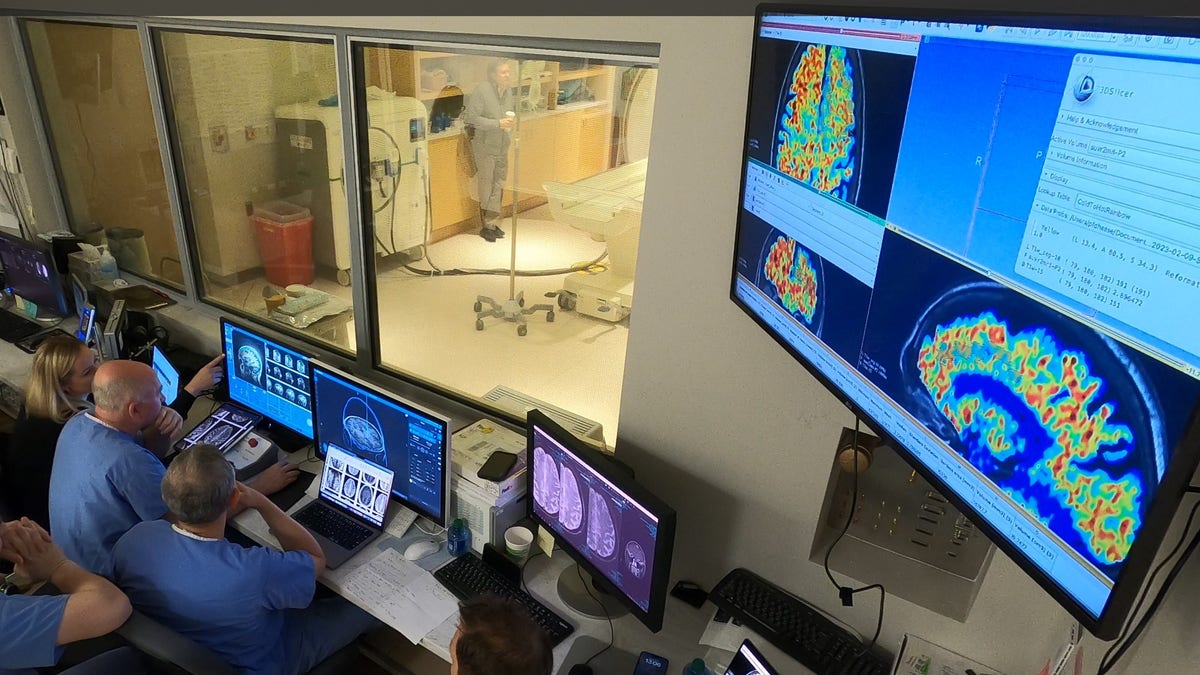
WVU's RNI team, shown in the MRI room control area, plans a blood-brain barrier treatment with ultrasound. (Rockefeller Neuroscience Institute (RNI) at West Virginia University (WVU))
“This was the first in a three-participant human safety and feasibility study showing that opening the BBB can accelerate the clearance of amyloid beta plaques,” study leader Dr. Ali told Fox News. Rezai, director of WVU's Rockefeller Neuroscience Institute (RNI). Digital.
“Noninvasive focused ultrasound is an outpatient procedure that allows targeted delivery of therapies to the brain that can potentially accelerate the benefit of antibody treatment in Alzheimer's disease,” he added.
DEMENTIA AMONG YOUNG PEOPLE IS LINKED TO 15 FACTORS, GREAT STUDY REVEALS
All three patients, ages 59 to 77, had mild Alzheimer's disease.
During the study, they received six monthly infusions of the antibody aducanumab.
After each treatment, focused ultrasound was used to open the BBB at sites of greatest plaque accumulation.
While there are some potential risks associated with the use of ultrasound, such as brain swelling and hemorrhage, Rezai said those effects were not seen in this study.
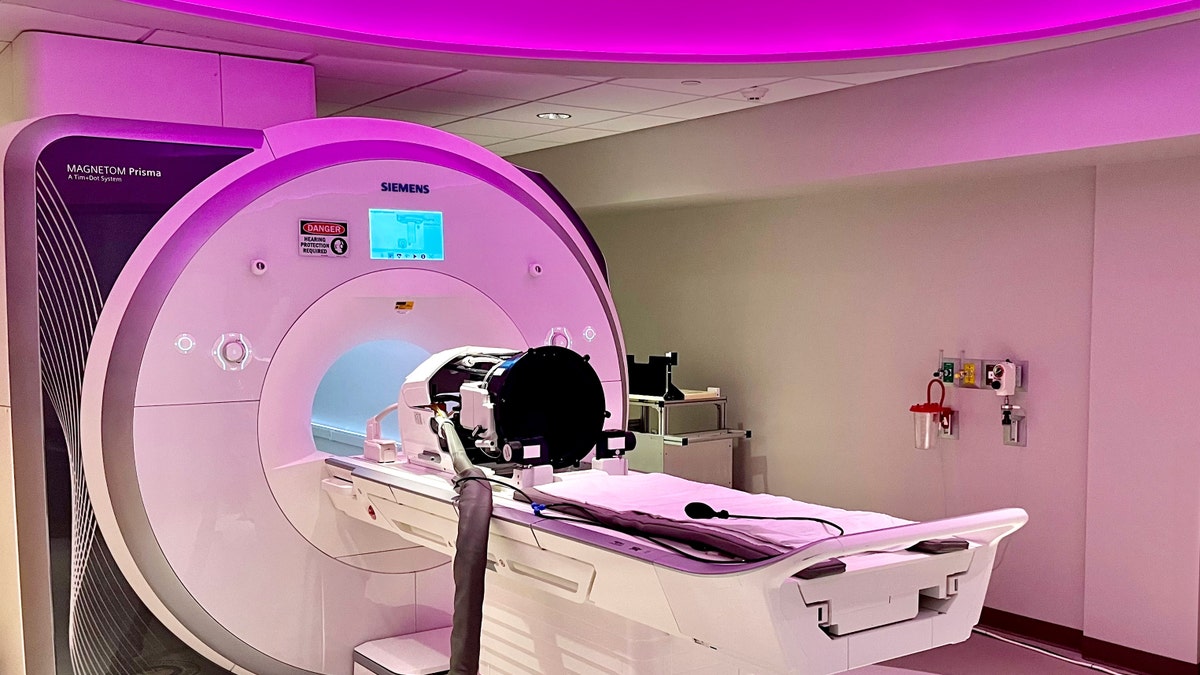
The focused ultrasound helmet unit with 1024 ultrasound transducers connects to the MRI table for MRI-guided treatment. (Rockefeller Neuroscience Institute (RNI) at West Virginia University (WVU))
“We verified with MRIs that the opening of the BBB was temporary and closed between 24 and 48 hours after the FUS procedure,” he told Fox News Digital.
Reductions in amyloid plaques were verified in PET scans.
SMOKING SHRINKS THE BRAIN AND INCREASES THE RISK OF ALZHEIMER, NEW STUDY FINDS
This was the first step towards broader studies; In them, researchers will be able to evaluate more patients and larger areas of the brain, Rezai noted.
In the next phase of the clinical trial, ultrasound therapy will be combined with lecanemab, another anti-amyloid beta antibody.
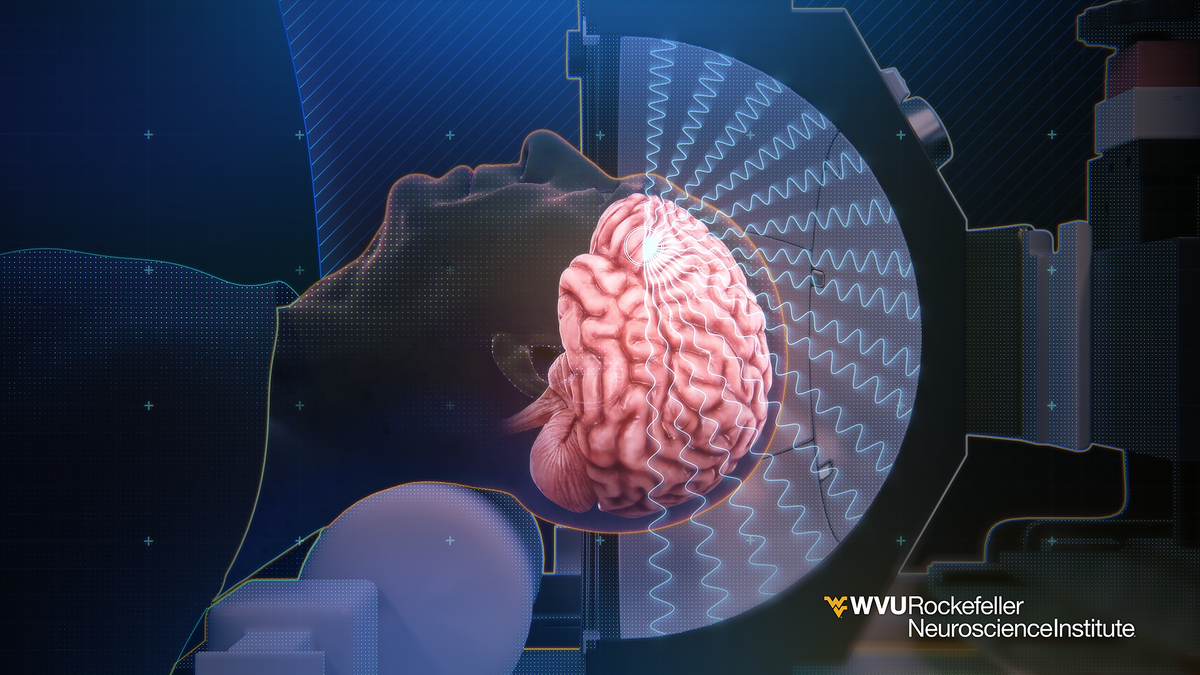
This three-dimensional illustration shows how ultrasound waves from inside the helmet converge on a focal point in the brain that is used to open the blood-brain barrier. (Rockefeller Neuroscience Institute (RNI) at West Virginia University (WVU))
Dr. James Galvin, director of the Comprehensive Center for Brain Health at UHealth, the University of Miami Health System, was not involved in the WVU research, but shared his reaction.
“A study like this is important because it shows that there may be safe ways to increase drug delivery to the brain without serious adverse effects,” he told Fox News Digital.
THE STUNNING FINANCIAL COST OF DEMENTIA IS REVEALED IN NEW REPORT: THEY ARE 'FAMILIES IN BANKRUPTCY'
“Focused ultrasound has been used in other treatment paradigms for brain diseases such as Parkinson's disease and brain tumors,” Galvin continued.
Galvin also cautioned that this research was conducted with only three patients and was not a placebo-controlled study.

It is estimated that in 2023, 6.7 million Americans aged 65 and older were living with Alzheimer's. (iStock)
“It was also designed as a safety study and was not adequately powered to detect significant clinical changes,” he added. “It's still too early to make specific recommendations, but I'm excited to see if there are follow-up studies planned with larger numbers of patients.”
Rebecca M. Edelmayer, PhD, senior director of scientific engagement at the Alzheimer's Association, was also not involved in the study, but called the results “very intriguing,” though preliminary.
“The blood-brain barrier, in its healthy form, protects the brain from harmful agents that could reach it through the bloodstream,” he told Fox News Digital via email.
CLICK HERE TO SUBSCRIBE TO OUR HEALTH NEWSLETTER
“Getting therapy across this barrier (from the bloodstream to brain tissue) is a challenge for any drug used to treat brain diseases, including drugs to treat Alzheimer's disease.”
Edelmayer added that while this was a “very small, relatively short-duration study,” it was a valuable way to test a “cutting-edge idea” to improve the effectiveness of anti-Alzheimer's drugs.
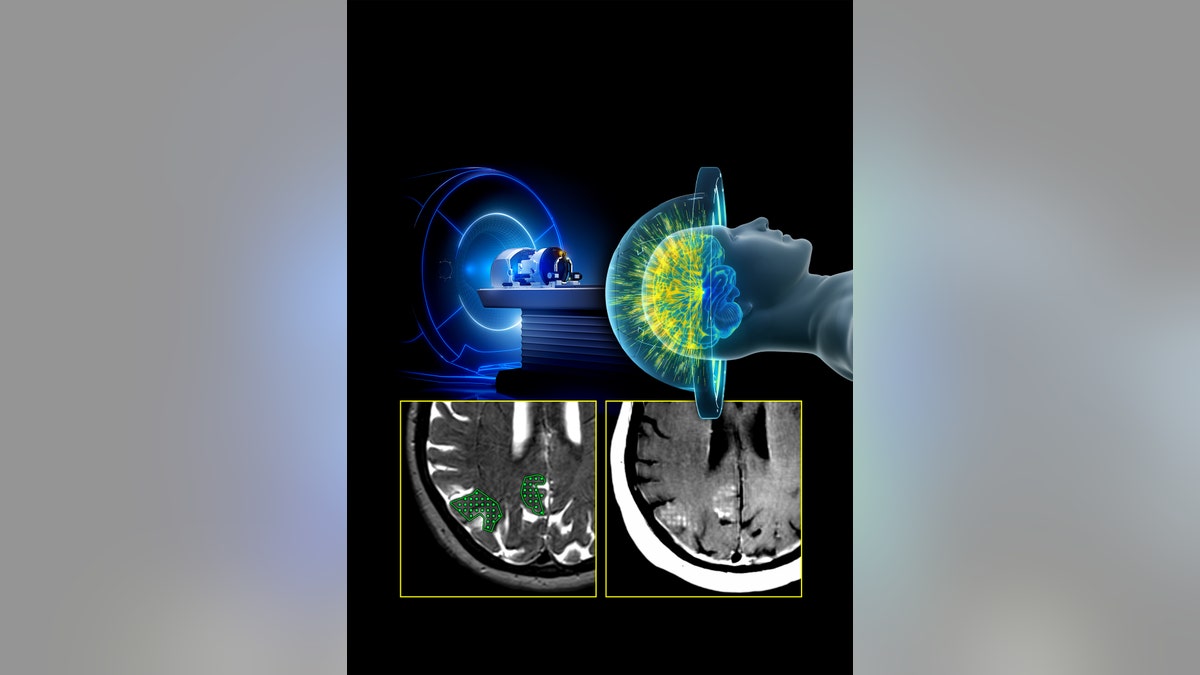
This illustration of the MRI-guided focused ultrasound system includes a representation of the treatment delivery, the target region, and the corresponding opening of the blood-brain barrier demonstrated by contrast enhancement. (Rockefeller Neuroscience Institute (RNI) at West Virginia University (WVU))
Focused ultrasound-induced opening of the blood-brain barrier has also been shown to improve drug delivery to treat brain tumors, Edelmayer noted.
“This is a great example of how learnings from research in other diseases could be reused for Alzheimer's disease and other dementias.”
CLICK HERE TO GET THE FOX NEWS APP
Looking ahead, Edelmayer said the results of this initial research point to the need for longer and larger scale trials.
“We need more research in people with Alzheimer's disease from all communities to understand the full impact this approach could have.”
For more health articles, visit www.foxnews.com/health.

